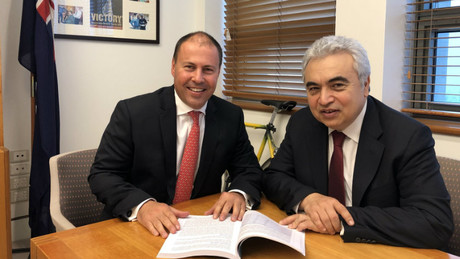Australia's energy efforts broadly commended by IEA

The International Energy Agency (IEA) has commended Australia’s commitment to affordable, secure and clean energy, though it suggests the federal government could ramp up its ambitions.
The publication ‘Energy Policies of IEA Countries — Australia 2018 Review’ acknowledges that Australia’s energy sector is undergoing a significant transformation, with South Australia in particular introducing higher shares of variable wind and solar power into the power system.
But this is putting the energy market under pressure, with growing concerns about affordable and secure energy following several power outages, a tightening gas market in the east coast and rising energy prices. Furthermore, while Australia’s carbon intensity is in decline, it is still the highest among IEA countries.
The Australian Government asked the IEA to assess the country’s progress since the previous review in 2012, as well as to suggest how Australia can use global best practices in transitioning to a lower-carbon energy system. In this context, the IEA also contributed to the Finkel Review.
The report commends the government’s efforts to implement reforms to foster reliability and security of supply, prompted by the South Australian blackout of September 2016 and the Finkel Review. However, it states that a consistent energy and climate framework up to 2030–50 is needed at the Commonwealth level to ensure continued and adequate investment in the energy sector.
“The government’s efforts to ensure energy security and move ahead with market reforms have been impressive,” said IEA Executive Director Dr Fatih Birol, who presented the report’s findings this week in Canberra. “Australia can develop its vast renewable resources and remain a cornerstone of global energy markets as a leading supplier of coal, uranium and liquefied natural gas (LNG), securing the energy for growing Asian markets.”
The report notes that Australia is leading the next wave of growth in LNG, and that the sustainable development of new gas resources is critical for natural gas to play a growing role in the energy transition. It calls on Australia to continue efforts to improve transparency of gas pricing, boost market integration and facilitate access to transportation capacity.
The review also welcomes the government’s energy security focus, including the creation of the Energy Security Board and Energy Security Office as well as Australia’s plan to return to compliance with the IEA’s emergency stock holding obligations. The IEA recommends regular and comprehensive energy security assessments to identify risks early on, and foster the resilience of the energy sector.
In terms of power system security, the report offers recommendations on how to improve the market design of the National Energy Market (NEM), already one of the most flexible power markets in the world. To accommodate higher shares of variable renewables, the IEA recommends that the NEM prioritises measures to safeguard system stability, enhance grid infrastructure, including interconnections, and regularly upgrade technical standards. As consumer choice and prices in retail markets are liberalised across Australia, the government needs to focus on wholesale competition and demand-side flexibility, in recognition of the changing ways energy is produced and consumed, thus contributing to reducing peak demand.
Other recommendations include the following:
- Work with experts to drive big energy efficiency improvements in existing buildings.
- Reintroduce a program that supports big industrial energy users to improve their energy efficiency.
- Adopt ambitious fuel efficiency standards for the transport sector.
Ultimately, the review finds that Australia should rely on long-term policy and energy market responses to strengthen energy security, foster competition and make the power sector more resilient. According to Dr Birol, “A comprehensive national energy and climate strategy is needed for Australia to have a cleaner and more secure energy future.”
The Energy Efficiency Council (EEC) has welcomed the report, with CEO Luke Menzel claiming it confirms that Australia is behind the eight ball when it comes to energy efficiency.
“Whether it’s buildings, industry or transport, the IEA has found there is much more we can do to slash energy costs and reduce carbon emissions through smart energy efficiency policies,” he said.
Menzel said the report confirms the view of local experts, claiming that Australia is “missing the boat when it comes to energy efficiency policy … despite the fact that it’s the cheapest and quickest way of slashing energy bills and reducing carbon emissions”.
“We have a good framework in the National Energy Productivity Plan,” he said. “It’s time for the Turnbull government to put some meat on the bones of that plan and drive the kind of step change in energy efficiency that will get us back in the game.”
Berrima Cement Works upgrades with sustainable tech
Boral has unveiled new carbon-reducing technology at the site, which supplies 40% of cement in...
Australian orgs partner to speed circular economy
GS1 Australia has joined forces with the Product Stewardship Centre of Excellence to drive the...
Victorian utility recognised at Asian Water Awards
South East Water won two awards for its Hydrotrak Geofencing technology, which has helped it to...









